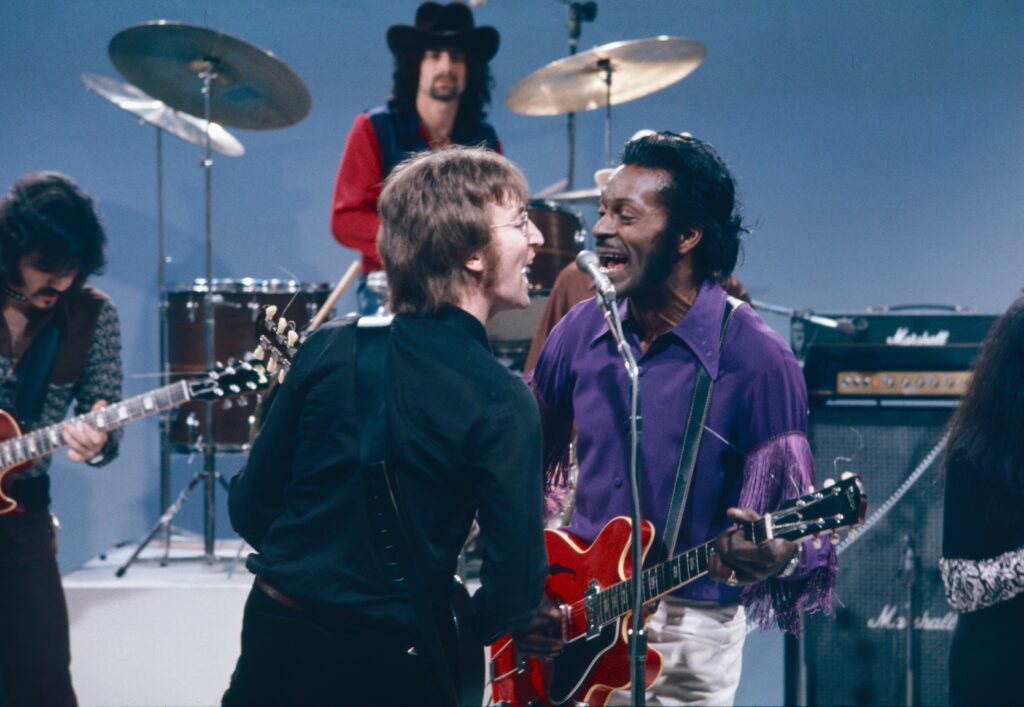New Documentary Recounts a Mainstream Moment for Counterculture, When John Lennon and Yoko Ono Took Over ‘The Mike Douglas Show’
As cinema, ‘Daytime Revolution’ is pedestrian in form, but it is invariably entertaining and often revealing.

Did John Lennon regret meeting his hero, Chuck Berry? That’s the old saw about how it can be disappointing or demoralizing upon coming face-to-face with someone who has had a significant impact on your life.
Watching Lennon in Erik Nelson’s new documentary, “Daytime Revolution,” one would say not. “The smart Beatle” is just short of giddy in Berry’s presence, extolling the lyricism and primacy of the man’s music. Berry repeatedly squeezes Lennon’s arm in gratitude. One is reminded of how the camera is capable of capturing moments of unfiltered emotion.
It can also capture moments of less-than-earthshaking consequence — in this case, Lennon and Berry running through a version of the older musican’s chestnut, “Memphis.” What isn’t wrong with it? Berry’s guitar is muffled, Lennon isn’t on key, and Yoko Ono’s signature ululating is a talent whose appeal continues to be lost on me.
Also, at the risk of overstating the obvious, Lennon’s back-up band, Elephant’s Memory, isn’t the Beatles. And so the song galumphs along, a cacophonous moment in history spurred by one anomalous player, Mike Douglas.

One wonders what Douglas made of this particular take on “Memphis.” A daytime chat show host is where his career took him, but not where it started: Douglas began as a vocalist, working as “staff singer” at radio stations in Oklahoma and Illinois before moving to Los Angeles and joining up with bandleader Kay Kyser and his Kollege of Musical Knowledge. Douglas scored a few hits with Kyser and made enough of an impression on Walt Disney to be hired as the singing voice of Prince Charming in “Cinderella” (1950).
The vagaries of show business being what they are, Douglas ultimately found himself ensconced as the host of a daytime talk show in 1965. He never looked back. His affable manner, manicured good looks, and inquisitiveness — probably cultivated, invariably convincing — made “The Mike Douglas Show” popular, profitable, and a good way for housewives to take a break from their duties.
That was true for kids coming home from school, too: Douglas’s show is where I typically headed with my afternoon snack after a hard day at Hillside Junior High. Particularly memorable was the episode in which comedienne Totie Fields flustered the musician Gene Simmons, seen in full Kiss regalia, by unveiling him as a “nice Jewish boy.” Ouch.
All of which is a roundabout way of saying that I remember watching Mr. Nelson’s “Daytime Revolution” — that is to say, the week Douglas’s co-hosts were Lennon and Ms. Ono. What I saw in 1972 had me scratching my head; what I’ve re-watched in 2024 has me scratching my head, albeit for a different set of reasons.
As an adolescent, I tuned in to see a Beatle and found myself exposed to the counterculture. As an adult, I tuned in out of nostalgia and received confirmation of just how common the counterculture has since become. Mr. Nelson is more gung-ho about these things, averring that Woodstock was not the end-all and be-all of a “revolutionary era.” Rather, it was the week when “two of the most vibrant, articulate, and brilliant revolutionaries were handed a viewing audience of 40 million mainstream American … unmediated.”
Okay, let’s bite: Among the panelists invited by John and Yoko were the founder of the Yippies, Jerry Rubin; co-founder of the Black Panthers, Bobby Seale; consumer activist Ralph Nader; macrobiotic chef Hilary Redleaf; avant-garde musician David Rosenboom; and biofeedback researcher Gary Schwartz, a Harvard professor. Comedian George Carlin was also featured but isn’t much seen in “Daytime Revolution.” Singer Vivian Reed is, and for that we should be grateful: Her rendition of the gospel hymn “His Eye on the Sparrow” is thrilling.
A film review isn’t the best place to enumerate the encompassing reach, as well as the considerable failings, of 1960s counterculture, though it’s worth noting that Lennon would later become jaundiced about its capabilities. But here he’s relaxed and goofy, clearly energized by Ms. Ono and, notwithstanding some predictable cant, unpretentious. Also, is it just me or did his professional relationship with Douglas turn into a veritable bromance as the week went on? The two commune on subjects — the Beatles and family, especially — in ways that surprise and are sometimes moving.
Mr. Nelson intersperses footage of daily news reports within a day-to-day replay of “Douglas Show” episodes, and he interviews participants who are still with us, including Mr. Nader, Ms. Redleaf, and activist and folksinger Nobuko Miyamoto. As cinema, “Daytime Revolution” is pedestrian in form, but it is invariably entertaining and often revealing. Watching Ms. Ono engaging the audience with sundry collaborative projects is enough to make you think that her true calling is not as a doyenne of Conceptual Art, but as an elementary school teacher. Tidy revelations such as this make “Daytime Revolution” worth attending to.

